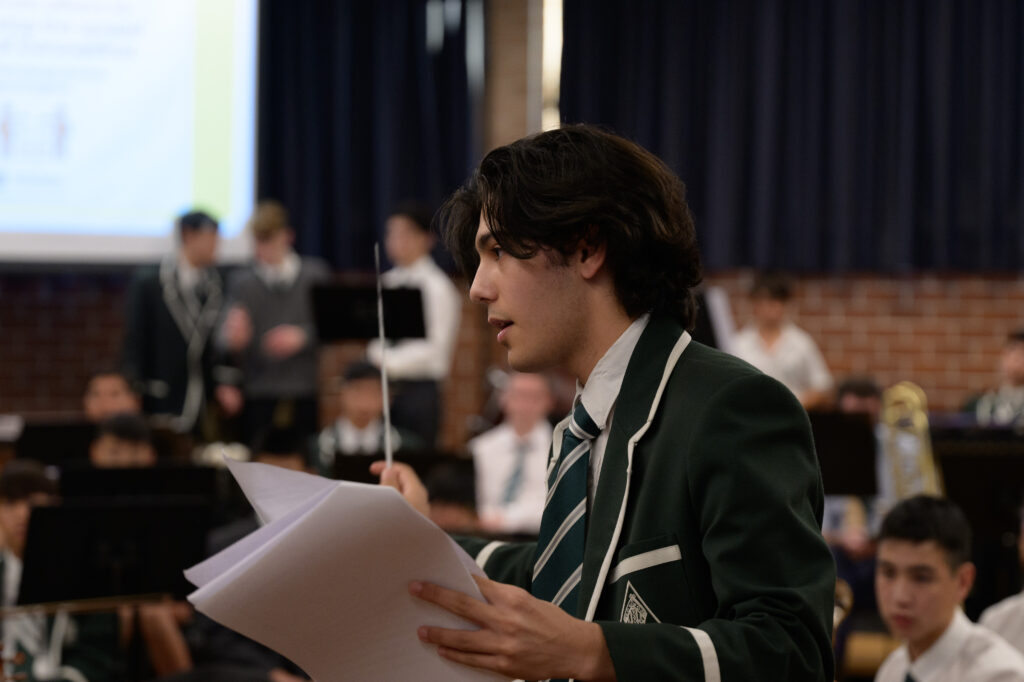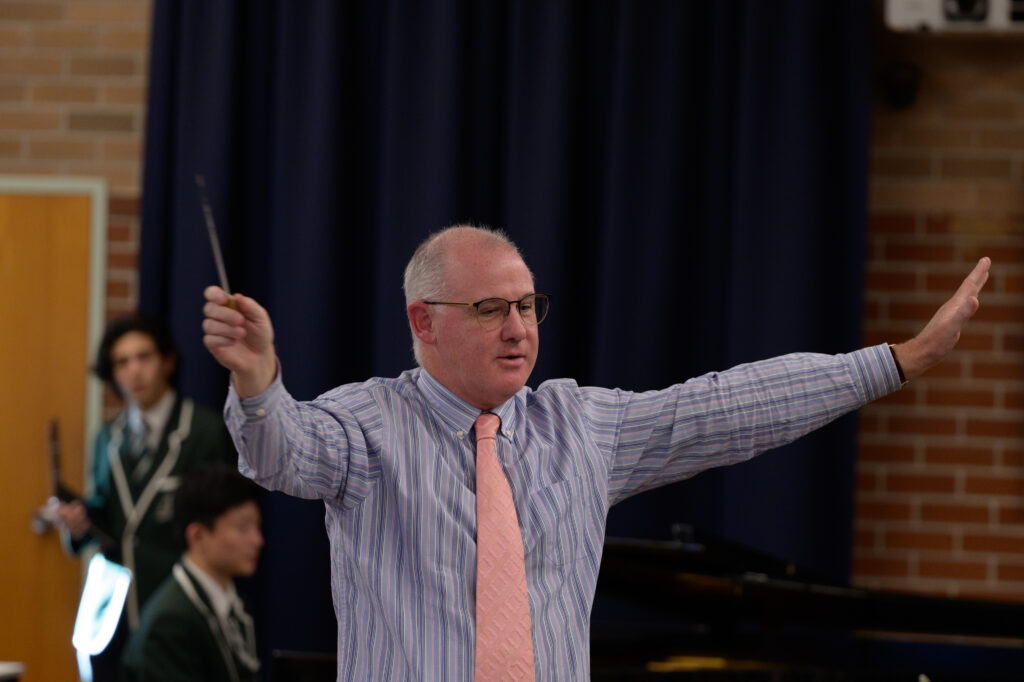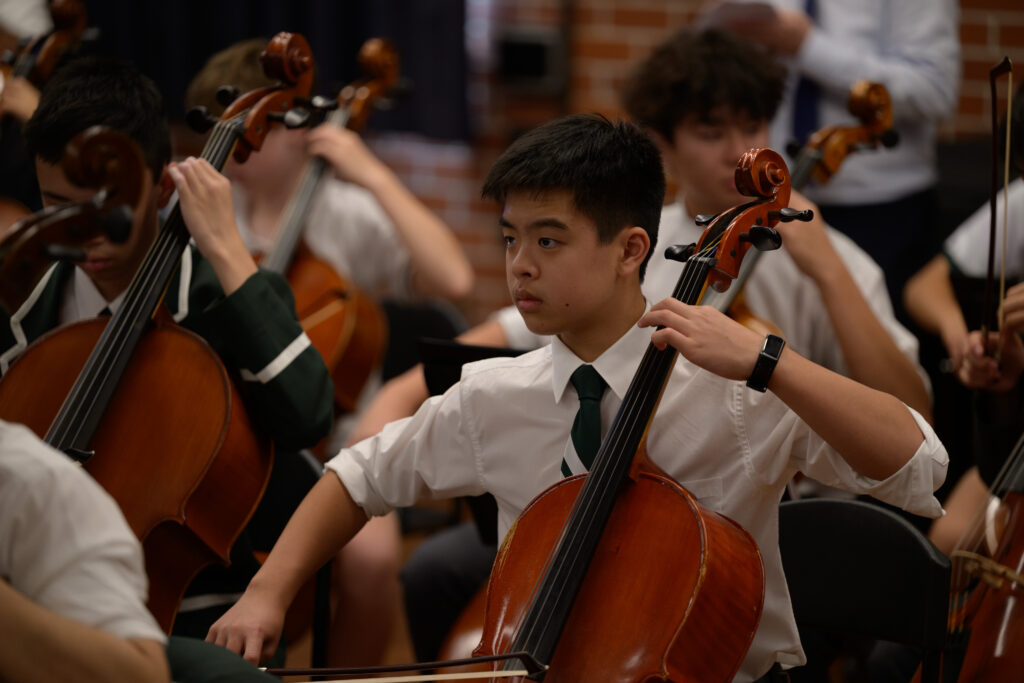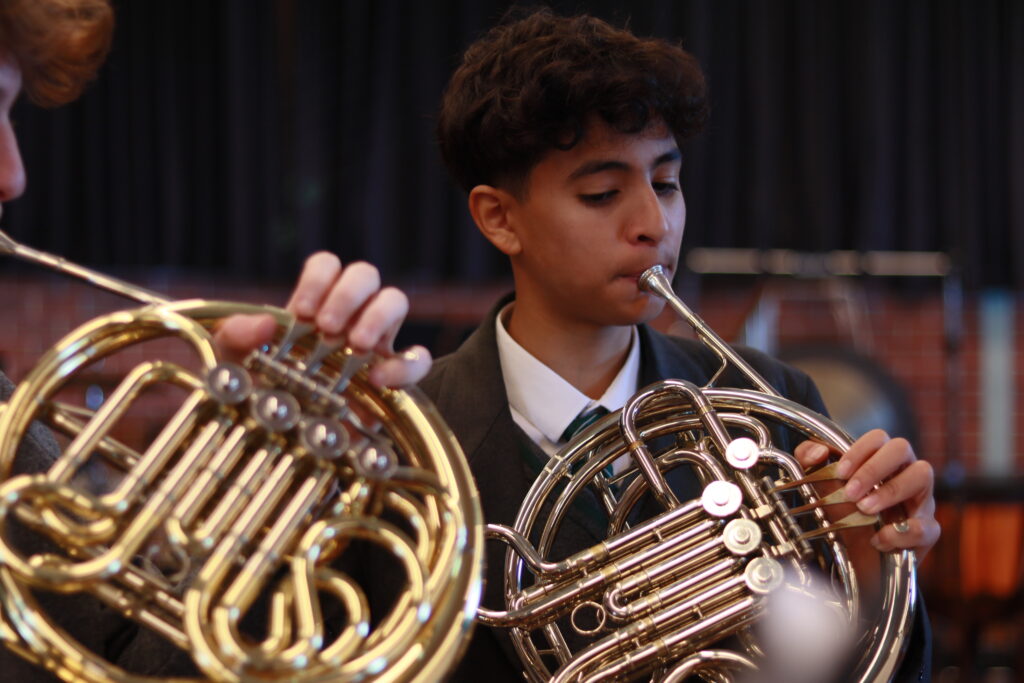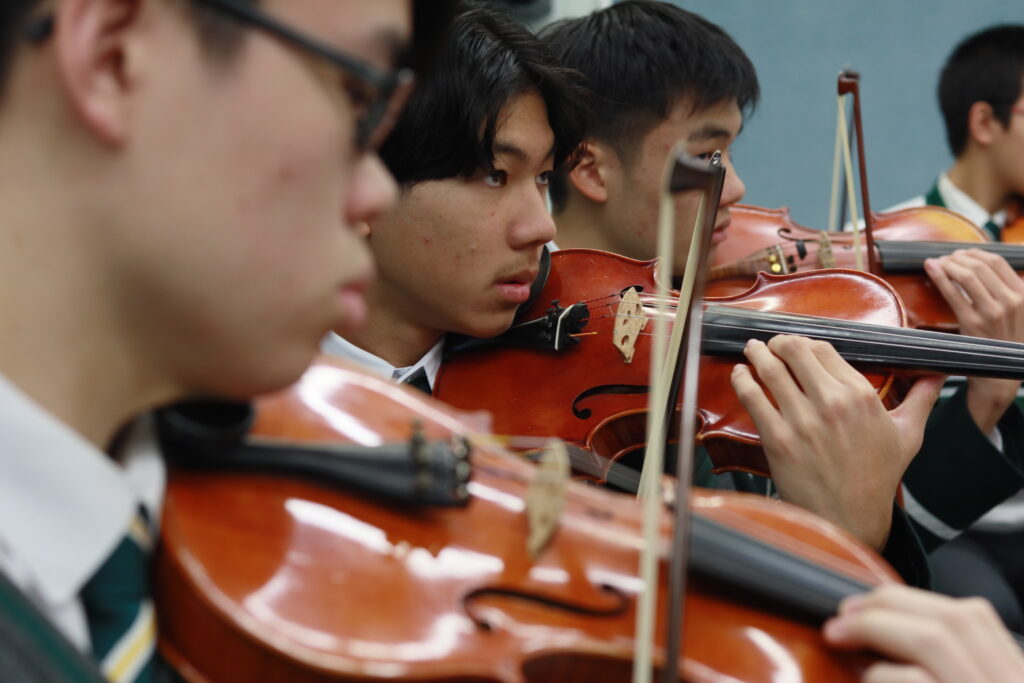Let’s dance
A tale of two composers, and 202 performers
Trinity’s showcase musical extravaganza demands an intense personal and collaborative effort – 272 hours of formal rehearsal time, to be exact, for the combined cast of 202 performers.
This year’s event, themed Let’s Dance and staged again at the world-class City Recital Hall, concentrated two minds in particular – those of Year 12 students Zach Nguyen and Vivek Singleton, who joined forces to compose their own two-movement orchestral suite.
No pressure, right? But even they acknowledge there’s nothing wrong with a little performance anxiety. It’s one of the factors driving students to practise, work together, and stretch themselves for an event they will remember for years.
Their composition, the Contemporary Music Maker, created as an International Baccalaureate (IB) submission, was designed to reflect the range of emotions in their own musical lives.
“The process of writing it is encapsulated in the piece itself,” said Vivek, a guitarist. “It’s the journey of a music student, at times angry and frustrated, at other times lively and happy. It tries to encompass our musical progression through school, and the ups and downs of life.”
Zach, a violinist, said the hardest part was to produce one coherent work from two different creative minds.
In creating their suite for 16 parts, the two tyro composers, who both have A.Mus diplomas, turned for some tips to Leon Liang (2018) a Trinity Old Boy studying at the Con in Vienna.
“He gave us some advice on different textures and tone colours that work,” said Zach. “He wasn’t feeding us or telling us what to do, but giving us possibilities and suggestions.”
Few worthwhile achievements come easily, and the two partners were brutally honest with each other.
Vivek had to learn to “kill your darlings”.
“There are things you want to include but you don’t have time. And you cut them. But the end product is 100 per cent worth it. The collaborative process takes weight off your shoulders. For me I knew I was working with someone who knows what he’s doing.”
Director of Co-curricular Music, Michael McGregor, said their work was crucial in showcasing the connection between the School’s Co-curricular and Academic programmes.
“It could change the way that parents and students look at the music programme.
“This year, we had three movements from three different ballets and the Choir sang an Irish folk tune about dancing. As we put the programme together, it was obvious the theme had to centre around dance.”
The Gala Concert teaches many lessons, not least how to handle big occasions.
Prep School violinist Cayden Tsang (5D), for example, one of the youngest-ever recipients of the A.Mus diploma at the age of nine, says experience is the key.
“Behind the scenes I’m nervous. But when I get on stage and I put my violin up and play the first note, it’s like the audience are all gone. I just focus on the piece. I don’t care what the audience do. It’s purely on experience. The more you have the more confidence you gain.”
The Junior School’s Clancy Tian (6T), another A.Mus-level violinist, described his first Gala Concert as “very special” and said he appreciated making music in a group.
“I can play with other like-minded people, and know how my instrument fits in with other instruments.
“It builds a connection between instruments, and I can hear what my part is. It gives me a great sense of musicality. It’s definitely more fun. I can connect with a wide range of people.”
Both are members of at least four ensembles, including the Symphony Orchestra, Chamber Orchestra, Serenata Strings, and Vivaldi Strings.
Cayden’s father, Chris, a former dux of the School, said playing with older students gave younger musicians something to aspire to and encouraged teamwork.
“It’s like sport. In an orchestra or ensemble, you’re in a team. If any one person lets the team down – if you don’t turn up or practice – the whole team is affected.
“So that responsibility is instilled at a very young age.
“The benefit of working together towards performing at a world class venue is priceless.
“They absorb it as a group. Backstage they’re all a bit giggly, nervous; that’s all part of the fun. They spend the whole day at the Recital Hall rehearsing, they have 300 pizzas delivered … that type of experience is priceless.
“Most of these kids may not become (professional) musicians but that experience they take away with them – you can’t buy that, you can’t organise it yourself, and most schools won’t provide that. It really sticks in their brains.”
Zach Nguyen said Trinity had “all the steps in the right places for people to progress; they’re not too pushy.”
His co-composer, Vivek Singleton, said he drew inspiration from other students.
“I sat next to this brilliant guitarist who was leagues better than me, and still is. The School does have fantastic teachers but they foster a good environment so as a student you look around and see amazing things.
“Trinity attracts a great quality of students. You look at all disciplines, sport for example; it’s not that just that Trinity has a few great sports coaches, it’s that it also fosters brilliant students. Academically it’s the same thing.”
The issue of how hard to push students is a thorny one, but it’s equally important to acknowledge how much music means to many proficient players.
“Without music I wouldn’t be myself,” said Cayden Tsang.
“I wouldn’t have lived this way for nine years. If music never came to me, it’s almost like I would be in the corner; I would be nobody. I’m so lucky that music came to me. I feel blessed that music took part of my life. It’s part of my personality.”
This year’s Gala Concert featured the Symphony Orchestra performing a movement from the ballet “Spartacus” by Khachaturian; Dance of the Knights from Romeo and Juliet by Prokofiev, and the Finale from Swan Lake by Tchaikovsky.
The Contemporary Ensemble presented Let’s Dance by David Bowie, and the Sinfonietta played Waltz by Eric Korngold.
The Trinity Choir sang Phil the Fluter’s Ball by Percy French, and the Combined Junior School and Preparatory School choirs sang Southern Land by Paul Jarman, accompanied by a Didgeridoo player and an Aboriginal dancer.
This article originally appeared in our July Edition of Trinity News.
Request a physical copy of Trinity News or view our online digital bookshelf.


